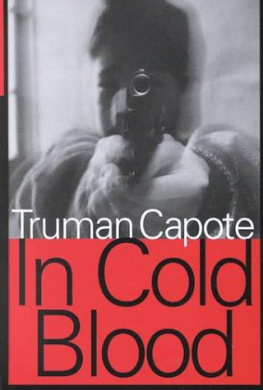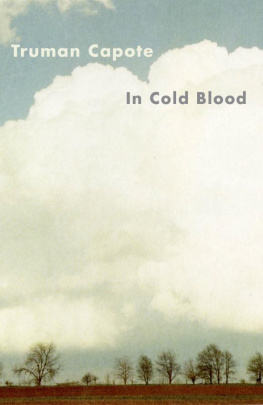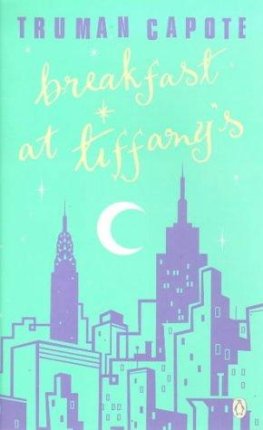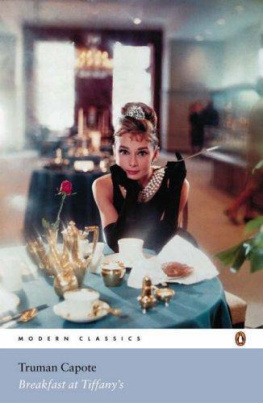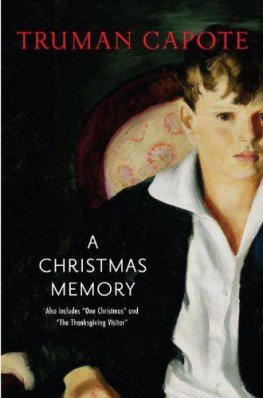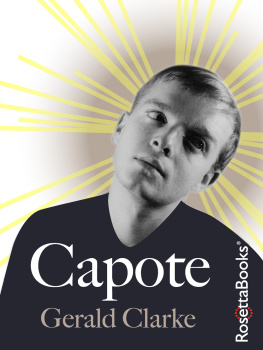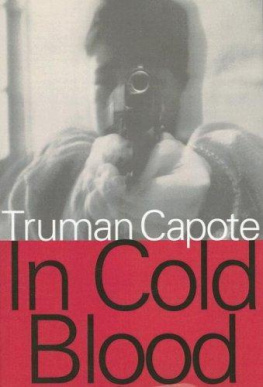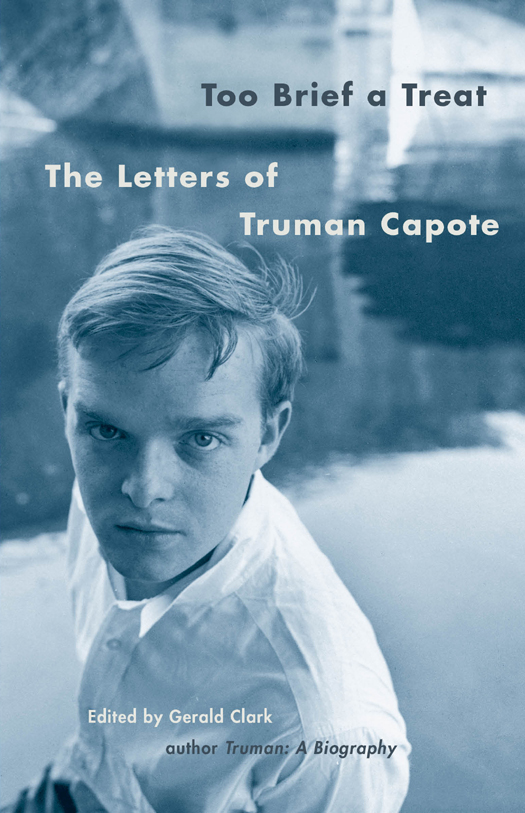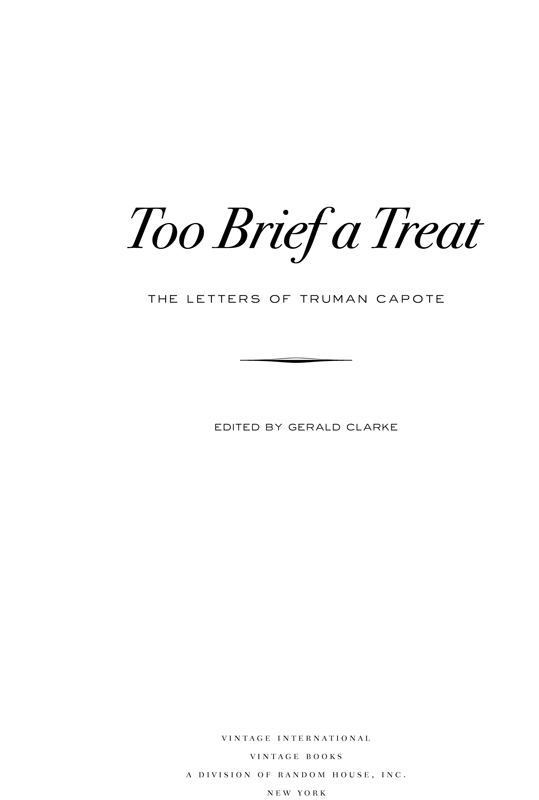ACCLAIM FOR GERALD CLARKES
Too Brief a Treat:
THE LETTERS OF TRUMAN CAPOTE
Capotes letters [are] as addictive as potato chips, often very funny and reflect a gift for empathy.
Los Angeles Times Book Review
[A] real pleasure for Capote fans. Clarke, the author of the warm, sympathetic and insightful 1988 biography Capote, has served his subject well, gathering letters from all over the world, and providing thoughtful introductions to each section of Capotes life. There is wicked fun in reading these letters. Truman Capote was a breath of fresh air, rare and witty and urbane.
The Times-Picayune
There are, as one would expect, lovely, delicate lines along with the nervy charm of the writers unabashed effeminacy. There are also sharp sightings and some feline boldface dispatches [and] a measure of scandalous fizz.
The New Yorker
Charming. Intriguing. The letters will doubtless provide many tasty morsels for students of midcentury American social and publishing history.
The New York Times Book Review
Offer[s] Capote acolytes a compendium of snappy remarks and several details of more serious interest.
The Advocate
Among the most unexpectedly hilarious reads of the year.
Genre Magazine
Poised, poignant, persuasive full of affection and caring. Reading his letters is a singular experience. They are newsy, capricious, full of endearments, a bit precious, funny, emphatic, occasionally duplicitous, and always signature Capote.
Library Journal
GERALD CLARKE
Too Brief a Treat
Gerald Clarke is the author of Capote: A Biography and Get Happy: The Life of Judy Garland. He has also written for many publications, including Architectural Digest, Time, where he was a senior writer, and Esquire. A graduate of Yale, he now lives in Bridgehampton, New York.

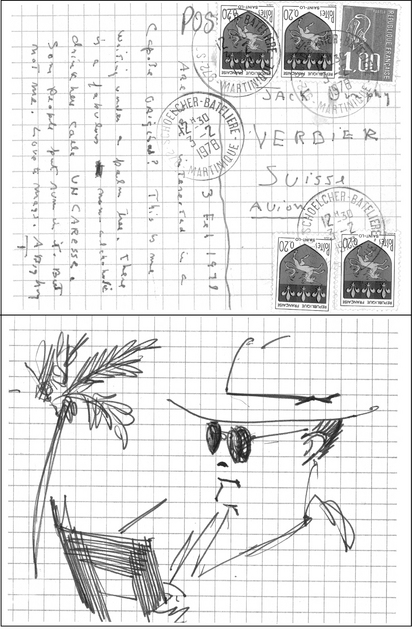

FIRST VINTAGE INTERNATIONAL EDITION, SEPTEMBER 2005
Copyright2004 by Gerald Clarke
Truman Capote material copyright2004 by The Truman Capote Literary Trust
All rights reserved. Published in the United States by Vintage Books, a division of Random House, Inc., New York, and in Canada by Random House of Canada Limited, Toronto. Originally published in hardcover in the United States by Random House, an imprint of The Random House Publishing Group, a division of Random House, Inc., New York, in 2004.
Vintage is a registered trademark and Vintage International and colophon are trademarks of Random House, Inc.
Frontispiece: Postcard to Jack Dunphy, February 3, 1978, with self-portrait.
Photo credits: , courtesy Gerald Clarke collection.
The Library of Congress has cataloged the Random House edition as follows:
Capote, Truman.
Too brief a treat: the letters of Truman Capote; edited by Gerald Clarke.1st ed.
p. cm.
1. Capote, Truman, 1924Correspondence. 2. Authors, American20th centuryCorrespondence. I. Clarke, Gerald. II. Title.
PS3505.A59Z495 2004
813.54dc22
2004050313
eISBN: 978-0-345-80309-2
www.vintagebooks.com
Cover photograph by Clifford Coffin/Vogue
The Cond Nast Publications Ltd.
Cover design by Megan Wilson
v3.1_r1
To Truman and Jack,
who remained true
in sunshine and in shadow
Your letter was too brief a treat
TO ROBERT LINSCOTT, MAY 6, 1949
SirWhy have you not answered my letter? I only write letters so that I will get them; please put this on a paying basis.
TO JOHN MALCOLM BRINNIN, JULY 14, 1950
Contents
19241948
The Exuberant Years: A Merlin in Alabama and a Puck in New York
19491959
The Years of Adventure: Off to See the World
19591966
Four Murders and a Ball in Black and White
19661984
Prayers: Answered and Unanswered
Introduction
Truman Capote wrote to his friends as he spoke to them, without constraints, inhibitions or polite verbal embroidery. Not for him was the starchy vow of Samuel Johnson, who complained that since it had become the fashion to publish letters, I put as little into mine as I can. Capote did just the opposite: he put as much into his letters as he couldhis hurts, his joys, his failures, his successes. The thought that his correspondence might someday be published apparently never occurred to him. Destroy!!! Capote, then only twenty-one, scrawled at the top of one gossipy letter. But how little he meant that command can be adduced from the sotto voce instruction that followedafter showing Barbara.
Christened Truman Persons, he became Truman Capote (pronounced Capote-e) after his parents divorced and he was adopted by his stepfather, Joe Capote. The first letter in this volume, written to his real father, Arch Persons, in the fall of 1936, when Truman was eleven or twelve, was his assertion of his new identity over the old one. I would appreciate it, he told Persons, if in the future you would address me as Truman Capote, as everyone knows me by that name.
The many letters that follow constitute a kind of autobiography. There is the very young Capote, childlike in his exuberance and high spirits, who, in the months that followed the end of World War II, jumped feetfirst into the turbulent waters of the New York literary scene. There is the only slightly subdued Capote of the fifties. Living most of the time in Europe with Jack Dunphy, who had been his companion since 1948, he busied himself with plays and screenplays, fiction and journalistic experiments.
Then there is the Capote of the early sixties, deeply involved in the research and writing of the most daunting and traumatic book of his life. That book was In Cold Blood, the story of the murders of a family of four in rural Kansas and of the two menPerry Smith and Dick Hickockwho murdered them. The publishing sensation of the decade, In Cold Blood combined the techniques of fiction with the factual reporting of nonfiction and it permanently transformed the writing of popular nonfiction. Thanks to the books success, the hungry eye of television and his own flamboyant personality, for several years Capote was the most famous writer in America, and probably much of the rest of the world as well.
Finally there is the Capote of the seventies and early eightieshe died in 1984who was disillusioned with both his life and his career and who became increasingly, and all too publicly, dependent on drugs and alcohol. The letters dwindled to almost nothing, mostly postcards and telegrams, and this book ends with a telegram from Capote in New York to Dunphy, who was, as always, spending the winter in Switzerland. All it said was: miss you need you cable when can i expect you Love Truman. (A chronology of Capotes life may be found in the back of the book.)


